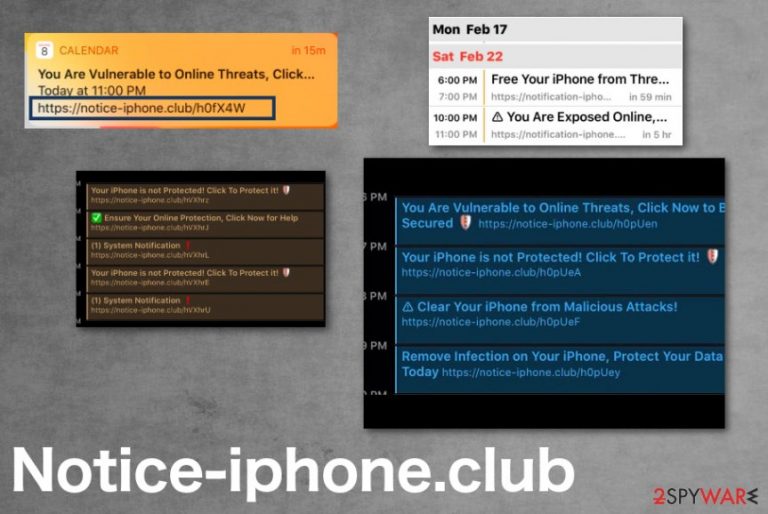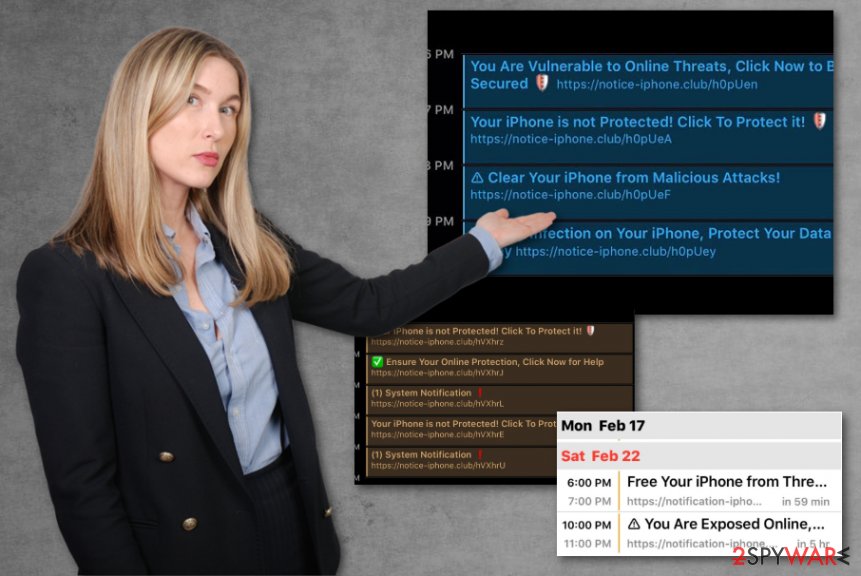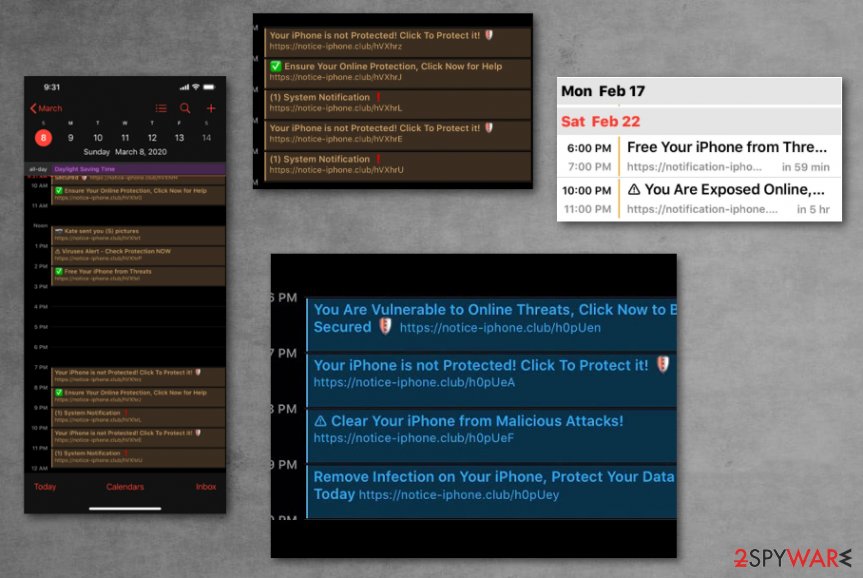Notice-iphone.club (Free Guide) - Removal Instructions
Notice-iphone.club Removal Guide
What is Notice-iphone.club?
Notice-iphone.club is the threat that appears on the calendar as fake messages and alerts with links to possibly dangerous sites

Notice iPhone Club virus is the hijacking program because it manages to control these calendar applications and interfere with any activities regarding online browsing with an intense amount of online ads and different intrusive material that comes to the screen of your directly. The alert may not trigger anything, but your interaction with one link leads to many other redirects and sites opened on the screen until it is not easy to exit the browser window without clicking on something possibly dangerous. Unfortunately, once a potentially unwanted program or even more intrusive virus ends up on your computer, many changes can be made in system folders and preferences, so the less you click on anything, the better.
| Name | Notice-iphone.club |
|---|---|
| Type | Mac malware |
| Danger | The site redirects to questionable pages online and advertising services, or even malware-laced websites where direct interaction with the content can lead to downloads and PUP installations. Such ad-supported pages can access data about users' online browsing habits and track that information, use it for their or third-party company purposes[1] |
| Main symptoms | Suspicious alerts about events, people or content on social media, lotteries, prizes, winnings and so on appear on the calendar applications |
| Related | iPhone Calendar virus |
| Version of | iPhone virus is the general umbrella term for threats affect strictly mobile Apple devices |
| Distribution | This site is a part of the shady campaign that can spread around via deceptive sites, misleading ads and triggered by potentially unwanted programs dropped during an insecure freeware installation [2] |
| Elimination | Notice-iphone.club removal includes a thorough anti-malware scan on the machine because you may have got a more serious infection on the machine without knowing or noticing already |
| Repair | Run FortectIntego on the system to clean the additional virus damage and fix possibly affected or even damaged system files. This tool is needed for general system performance improvement |
Notice-iphone.club is the program that diminishes the speed of your machine significantly, so you should react as soon as possible and clean the system to get back to a properly working machine. Unfortunately, clearing the calendar events or removing the affected application is not enough. These applications are all okay, but symptoms that you fin on them get caused by the PUP infection.
Notice iPhone Club message on the calendar can state about:
- malware risks;
- prizes;
- needed software updates;
- direct infection of cyber threats.
You can remove Notice-iphone.club from the machine by eliminating all related adware-type or general potentially unwanted programs. Because once the calendar app has those unwanted events added to them, it stats to shows deceptive notifications on your screen directly. All those alerts are designed to redirect to untrustworthy websites and open advertisements from one click on a safe-looking hyperlink.
Notice-iphone.club deceptive site contains advertisements, might ask for permissions to show additional notifications, display other pop-up windows, different verification forms, or notices that claim about prizes. All these deceptive messages also try to trick you into allowing notifications or visiting pages where views can get generated.
There are many users who got affected by Notice iPhone Club and started to receive such notices, notifications, and encountered unwanted events added to the calendar applications. Experts[3] note that these events, in most cases, get added after visiting deceptive pages or clicking on pop-ups, misleading windows, notifications. This often happens when you try to close them and end up triggering infections like this. 
Notice-iphone.club advertises other unwanted software and can try to trick you into downloading programs without even noticing sometimes. Or even act as the common scammy site that tries to obtain personal information from you by using keyloggers and other misleading techniques that lead to direct forms asking to put some information. It can be done by showing virus warnings and claiming the need for AV tools or remote access of IT experts.
Trusting such pages can lead to lost money or data when you reveal your credit card details. Pay them directly or allow the criminals to access your system. Notice-iphone.club can lead to privacy issues and identity theft or different losses, so try to avoid revealing any data to people behind these sites and other warnings or pop-ups.
If you already got affected by this calendar application virus, you need to make sure that the device is cleaned. The best option for such a removal process is to get an anti-malware tool and delete the Notice iPhone Club and other associated PUPs directly from your device. It is mainly targeting mobile devices, so choose a compatible tool and make sure to get it from an official provider.
When you are sure that all shady programs got terminated, go through the system with FortectIntego and fix possible virus damage or parts of the machine that Notice iPhone Club virus damaged or affected. Since calendar events can get added automatically and other settings may get altered without your knowledge, go to Calendar application and locate any added calendars on there, delete the ones that are not controlled by you and block questionable pop-ups on your browsers. Additional tips can be found at the end of this article. 
Mac malware gets sneakier than ever
People still tend to trust all those claims that macOS is immune to malware, and nor Mac computers nor iPhones can get infected. Unfortunately, these claims are false, and you should be aware that the Mac virus is a real threat, and the particular type of cyber intruders got indicated because of the persistence and popularity.
Mac malware is especially popular among scammers because it is easy to evade detections and block from operating systems and internet providers with those deceptive sites, misleading pop-ups, and malicious ads. This online content is the key to the distribution of such PUPs and mobile viruses.
You can try to avoid getting the infection if you pay closer attention to details, content you constantly visit, and sources you get programs from. Advanced or Custom installation options should be the only ones that you select, forget about Quick or Recommended options. This is how you can fully take control of what applications get to be installed on the machine, especially on the mobile device where there are more ways to spread malware silently.
Clean the machine to get rid of the Notice-iphone.club virus
Once the potentially unwanted program gets installed on the machine it can either load files and programs at the same time or install them later on. No matter the cases, you need to remove Notice-iphone.club and all those related programs to eliminate the threat completely. Anything leftover can still trigger redirects, pop-ups, and even intrusive alerts, so cleaning the device fully is crucial.
Make sure to run the full system scan using an anti-malware tool and perform the professional Notice-iphone.club removal by also improving the performance. Unfortunately, AV tools cannot do everything for you, so also don't forget to repair files in system folders and functions and features of the affected device using system optimizer or a cleaner.
You may remove virus damage with a help of FortectIntego. SpyHunter 5Combo Cleaner and Malwarebytes are recommended to detect potentially unwanted programs and viruses with all their files and registry entries that are related to them.
Getting rid of Notice-iphone.club. Follow these steps
Delete from macOS
Clean the machine fully from any content related to Notice-iphone.club PUP
Remove items from Applications folder:
- From the menu bar, select Go > Applications.
- In the Applications folder, look for all related entries.
- Click on the app and drag it to Trash (or right-click and pick Move to Trash)

To fully remove an unwanted app, you need to access Application Support, LaunchAgents, and LaunchDaemons folders and delete relevant files:
- Select Go > Go to Folder.
- Enter /Library/Application Support and click Go or press Enter.
- In the Application Support folder, look for any dubious entries and then delete them.
- Now enter /Library/LaunchAgents and /Library/LaunchDaemons folders the same way and terminate all the related .plist files.

Remove from Mozilla Firefox (FF)
Remove dangerous extensions:
- Open Mozilla Firefox browser and click on the Menu (three horizontal lines at the top-right of the window).
- Select Add-ons.
- In here, select unwanted plugin and click Remove.

Reset the homepage:
- Click three horizontal lines at the top right corner to open the menu.
- Choose Options.
- Under Home options, enter your preferred site that will open every time you newly open the Mozilla Firefox.
Clear cookies and site data:
- Click Menu and pick Settings.
- Go to Privacy & Security section.
- Scroll down to locate Cookies and Site Data.
- Click on Clear Data…
- Select Cookies and Site Data, as well as Cached Web Content and press Clear.

Reset Mozilla Firefox
If clearing the browser as explained above did not help, reset Mozilla Firefox:
- Open Mozilla Firefox browser and click the Menu.
- Go to Help and then choose Troubleshooting Information.

- Under Give Firefox a tune up section, click on Refresh Firefox…
- Once the pop-up shows up, confirm the action by pressing on Refresh Firefox.

Remove from Google Chrome
Go through your browser and all the extensions installed without your permission
Delete malicious extensions from Google Chrome:
- Open Google Chrome, click on the Menu (three vertical dots at the top-right corner) and select More tools > Extensions.
- In the newly opened window, you will see all the installed extensions. Uninstall all the suspicious plugins that might be related to the unwanted program by clicking Remove.

Clear cache and web data from Chrome:
- Click on Menu and pick Settings.
- Under Privacy and security, select Clear browsing data.
- Select Browsing history, Cookies and other site data, as well as Cached images and files.
- Click Clear data.

Change your homepage:
- Click menu and choose Settings.
- Look for a suspicious site in the On startup section.
- Click on Open a specific or set of pages and click on three dots to find the Remove option.
Reset Google Chrome:
If the previous methods did not help you, reset Google Chrome to eliminate all the unwanted components:
- Click on Menu and select Settings.
- In the Settings, scroll down and click Advanced.
- Scroll down and locate Reset and clean up section.
- Now click Restore settings to their original defaults.
- Confirm with Reset settings.

Delete from Safari
Remove unwanted extensions from Safari:
- Click Safari > Preferences…
- In the new window, pick Extensions.
- Select the unwanted extension and select Uninstall.

Clear cookies and other website data from Safari:
- Click Safari > Clear History…
- From the drop-down menu under Clear, pick all history.
- Confirm with Clear History.

Reset Safari if the above-mentioned steps did not help you:
- Click Safari > Preferences…
- Go to Advanced tab.
- Tick the Show Develop menu in menu bar.
- From the menu bar, click Develop, and then select Empty Caches.

After uninstalling this potentially unwanted program (PUP) and fixing each of your web browsers, we recommend you to scan your PC system with a reputable anti-spyware. This will help you to get rid of Notice-iphone.club registry traces and will also identify related parasites or possible malware infections on your computer. For that you can use our top-rated malware remover: FortectIntego, SpyHunter 5Combo Cleaner or Malwarebytes.
How to prevent from getting mac viruses
Access your website securely from any location
When you work on the domain, site, blog, or different project that requires constant management, content creation, or coding, you may need to connect to the server and content management service more often. The best solution for creating a tighter network could be a dedicated/fixed IP address.
If you make your IP address static and set to your device, you can connect to the CMS from any location and do not create any additional issues for the server or network manager that needs to monitor connections and activities. VPN software providers like Private Internet Access can help you with such settings and offer the option to control the online reputation and manage projects easily from any part of the world.
Recover files after data-affecting malware attacks
While much of the data can be accidentally deleted due to various reasons, malware is one of the main culprits that can cause loss of pictures, documents, videos, and other important files. More serious malware infections lead to significant data loss when your documents, system files, and images get encrypted. In particular, ransomware is is a type of malware that focuses on such functions, so your files become useless without an ability to access them.
Even though there is little to no possibility to recover after file-locking threats, some applications have features for data recovery in the system. In some cases, Data Recovery Pro can also help to recover at least some portion of your data after data-locking virus infection or general cyber infection.
- ^ Ad tracking. Wikipedia. The free encyclopedia.
- ^ Bundled software. Webopedia. Computer terms explained.
- ^ Bedynet. Bedynet. Spyware related news.
